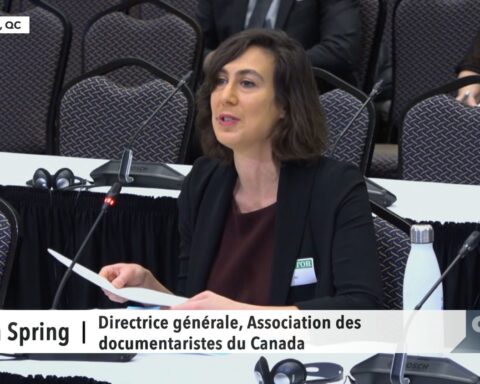What a time it’s been for private Canadian broadcasters. Here they are, in the midst of a mini depression, on the ropes from falling ad revenue, swimming in debt, and lucky them, Heritage Minister Moore has come to their rescue. In March 2009, Minister Moore cynically co-opted the Writers Guild of Canada’s invitation to visit Flashpoint’s writers’ room to make an announcement that threw the writers and the production industry completely off guard.
Moore told them that he would begin consultation on the imminent creation of a new Canadian Media Fund (CMF) with a twist: his fund would not only house the old Canadian Television Fund and New Media Fund, but it would be controlled in large part by the private sector cable companies who contribute to the funds. It’s control the cablecos have long asked for. Done!
Moore moved further towards trampling the Broadcasting Act. He also floated the idea that broadcasters would have access to the CMF for so-called ‘in-house’ production, thereby undermining the Act’s requirement that government and its regulator, the CRTC (Canadian Radio- television and Telecommunications Commission), create policy, which invigorates and sustains an independent production sector. Since Moore hasn’t introduced legislation to reform the Broadcasting Act, I can only charitably assume that he actually believes the CMF will be a good thing for all stakeholders, the way old trickle-down economists believed vastly obscene amounts of wealth at the top would trickle down to the benefit of all.
Now it’s fair to say that our cultural discourse has always retained this tension between cultural and industrial goals, but consistently when times get tough, industry always seems to triumph, owing perhaps to the obvious substantive power held by broadcasters, cablecos and their lobbyists to get what they want when panic sets in. So the CMF, if structured and governed as Moore suggests, will be tantamount to letting that bloody clichéd fox into the henhouse with platinum silverware and a silk bib provided courtesy of the Harper government.
But the field day hasn’t ended. Many broadcasters are up for renewal this year. It’s usually an occasion for them to spit and polish up to show how good they’ve been to the nation’s cultural goals of providing quality Canadian programming. The recession/depression, though, has provided them with a great opportunity to get many regulatory concessions. And indeed, the odds are good that the CRTC will respond favourably to the broadcasters braying for immediate and ‘temporary’ relief from Canadian Content and priority programming in prime time. Conventional ’casters like Global and CTV have also asked the CRTC to permit them to obtain subscription revenues for carriage from cablecos (no doubt an inflation move for consumers), to supplement falling ad revenue.
If the broadcasters’ wishes are granted, it’s clear that the independent production sector is in for a rough ride, not to mention Canadian citizens as a whole. If this configuration proceeds on track, we could face less independent commissions and fewer intellectual rights available to producers for work they produce and deliver. Minister Moore has demonstrated that he cares very little about these things. After all, we’ve witnessed how his otherwise sympathetic ear has turned shockingly deaf to the woes of the CBC, and to the concerns of the nearly 80,000 independent sector workers who wonder if cultural policy will go the way of the dodo, and along with it, their jobs.
There’s also a more ominous consequence to this potential change in cultural policy. Most principally, it puts the putative winners deeply indebted to the Harper government, on bended knee and ready to serve. Perhaps we’ll see less challenging political news stories and documentaries from news media sources. Perhaps too we’ll see an already anemic drama sector denuded creatively with soft topic content delivered in obeisance to the social conservatives in Harper’s traditional base. It could amount to a kind of censorship by stealth, which a minority government like Harper’s desperately needs to create a unified set of favourable representations of themselves.
It’s not a stretch when you think about it. What is a stretch is trying to convince me that our Heritage Minister, he of the “ipod” generation, is forward thinking and fair.











